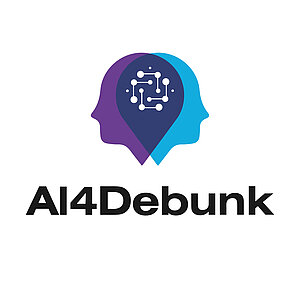

To radically transform the fight against disinformation, a four-year research initiative AI4Debunk – Artificial Intelligence for Debunking Disinformation (in latvian - Mākslīgais intelekts dezinformācijas atmaskošanai) was launched in January. Officially titled “Participative Assistive AI-powered Tools for Supporting Trustworthy Online Activity of Citizens and Debunking Disinformation", the project brings together an interdisciplinary consortium of 13 partners from eight countries. Their joint mission is to foster trustworthy online activity and develop AI-powered tools that help protect people from disinformation.
In recent years, the spread of disinformation has become a major challenge across Europe. Communication during the COVID-19 crisis and Russia’s invasion of Ukraine has been described as “war-like,” with the European Union (EU) engaged in an “infodemic” — a global battle of narratives. This “infodemic” is particularly challenging as Russia and China are highly experienced in organizing toxic disinformation campaigns, employing various manipulation techniques and destructive narratives in their “anti-EU” propaganda to gain influence. The use of artificial intelligence (AI) solutions can serve as a powerful tool for debunking disinformation. As European Commission President Ursula von der Leyen has stated: “AI is already changing our daily lives. And this is only the beginning. Used wisely and widely, AI promises enormous benefits for our economy and society.”
AI4Debunk aims to revolutionize the fight against disinformation and support trustworthy online activity. By developing AI-powered, human-centered tools, the project is committed to protecting democratic values and fostering a more informed and resilient society in response to the challenges of the digital age.
AI4Debunk aims to develop four human-centered, AI-powered interfaces: a web browser plugin, a collaborative platform, a smartphone application, and an augmented/virtual reality (AR/VR) interface — all built on the first open-source debunking API of its kind.
The plugin will be designed for integration with web browsers and social media platforms, providing users with instant notifications whenever they encounter false content, regardless of its format. The collaborative platform (Disinfopedia) will allow users to report suspicious content, which will then be verified by experts. The mobile app will enable people to detect disinformation directly on their smartphones. Finally, the AR/VR interface will offer guidance on how to deal with disinformation on social media in the future.
Project leader: prof. Inna Šteinbuka
Project partners:
- University of Latvia (Latvia) – lead partner, project coordinator
- Euractiv.bg (Free Media Bulgaria)
- Pilot4DEV (Belgium)
- University of Mons (Belgium)
- Internews Ukraine (Ukraine)
- National Research Council of Italy (Italy)
- University of Florence (Italy)
- Barcelona Supercomputing Center (Spain)
- DOTSOFT (Greece)
- University of Galway (Ireland)
- F6S Innovation (Ireland)
- Utrecht University of Applied Sciences (Netherlands)
- INNoVaTiVe POWER (Netherlands)
Implementation period: 01/2024-12/2027
Project ID: Horizon 101135757
Funder: EU programme “Horizon Europe”
Project dissemination channels:
Website: www.ai4debunk.eu
LinkedIn: linkedin.com/company/ai4debunk
X: x.com/ai4debunk
Facebook: facebook.com/ai4debunk
YouTube: youtube.com/@ai4debunk
29.01.2024. Latvijas Universitātes pētnieki iesaistās starptautiskā cīņā pret dezinformāciju
08.03.2024. Saeimā starptautiskā konferencē spriedīs par mākslīgā intelekta rīkiem dezinformācijas atmaskošanai
Konference “Mākslīgais intelekts dezinformācijas atmaskošanai”
Zanda Kalniņa-Lukaševica: mākslīgais intelekts ir tagadne, nevis nākotne
12.03.2024. Latvijas pētnieki vada vienu no Eiropas vērienīgākajiem projektiem cīņā ar dezinformāciju
13.03.2024. Why fighting disinformation is increasingly important and how AI4Debunk can contribute?
22.03.2024., blog post Interview Professor Inna Šteinbuka (University of Latvia)
28.03.2024. video Inna Šteinbuka: Kā apdzēst infodēmijas 'ugunsgrēku'?
27.04.2024. Saeimas priekšsēdētāja Daiga Mieriņa iepazīstas ar AI4Debunk projektu
28.05.2024. Žaneta Ozoliņa, Inna Šteinbuka. Latvija Eiropas Savienībā – 20 gadi
08.06.2024. Prof. Inna Šteinbuka sarunu festivālā “Lampa”:
- Vai varam ticēt savām acīm? LSM.lv saruna par dzīvi mākslīgā intelekta ērā
29.07.2024. AI4Debunk: Fighting Disinformation and Supporting Trustworthy Online Activity
02.10.2024. Project newsletter No. 1, foreword by I.Šteinbuka “Welcome to the Prism”
29.10.2024. Notiks simpozijs par mākslīgā intelekta lomu dezinformācijas izskaušanā
06.01.2025. Notiks vebinārs par mākslīgā intelekta iespējām novērst dezinformācijas radīto kaitējumu
15.01.2025. la.lv Atmaskots. Mākslīgo intelektu trenē misijai pret dezinformāciju
21.01.2025. Webinar "Combatting Disinformation Strategies, Threats, and the Role of AI" (recording)
21.03.2025. Notiks simpozijs par mākslīgā intelekta izmantošanu digitālajā pārvaldībā
25.03.2025. Ieplānota AI4Debunk konsorcija ģenerālā asambleja
10.06.2025. Kurš uzvarēs: Mākslīgais intelekts vai dezinformācija?
10.09.2025. Eiropas Komisijas priekšsēdētāja uzsver cīņas pret dezinformāciju nozīmi

 CONFERENCE
CONFERENCE